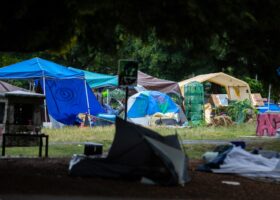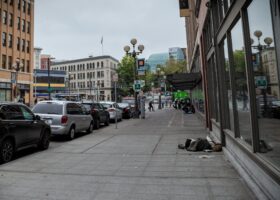Governor Inslee’s Legacy – 77.7% increase in homelessness
January 10, 2025
How will history view Governor Jay Inslee’s 12 years in office and his leadership on the homeless crisis?
If historians look at the facts, they will not be kind to the career politician when it comes to one of the major issues of the day.
Besides being an obedient follower of the controversial Housing First homeless policy, Governor Inslee has had a major impact on Washington’s homeless crisis:
- Imposed a carbon tax which hurts those on low or fixed income the hardest
- Failed to fix drug possession laws for two years as fentanyl flooded the state
- Enacted multiple extreme environmental policies which reduced housing supply
- The complete breakdown of the state’s mental health system
- Refused to work with multiple local jurisdictions to remove encampments
- Supported anti-police measures which increased crime among the most vulnerable
- Forced hundreds of unilateral pandemic decisions for 975 days (prisoner release, prohibiting 12-step meetings, eviction moratorium, etc.)
Despite a record-breaking doubling of state revenue in the past decade (fueled by 22 new taxes), the homelessness crisis has exploded in Washington State due to a failed liberal homeless policy (“Housing First”) which appears to be designed more to build a large housing bureaucracy than it is to reduce the suffering that is taking place on Washington’s streets.
New federal data reveals the dismal performance of Washington’s current political leadership on the homelessness issue. Since Inslee took office in 2013, homelessness has risen 77.7% (from 17,760 to 31,554)!
The U.S. Department of Housing and Urban Development released its annual report on homelessness during the holidays. The latest data was a serious blow to national Housing First advocates. The numbers revealed that despite billions of tax dollars being spent annually by all levels of government (federal, state, and local) to remove people from the streets, homelessness still increased in 2024 by a shocking 18.1% (after a 12% rise in 2023).
The federal report states that 770,000 people (equal to the population of North Dakota) are currently homeless in the United States.
(We should quickly note here that the Obama Administration made “Housing First” federal policy in 2013, promising it would completely eradicate homelessness by 2023.)
As bad as the news was nationally, it was much worse for the special interest groups in Washington State who financially benefit from Housing First policies. Seattle Times columnist Danny Westneat recently labeled the results as “disastrous.”
Washington is now only behind California and New York for the number of homeless individuals at 31,554 – despite a population one-fifth the size of California and two-fifths of New York. Even such populous states as Florida, Texas, Michigan, Ohio, Pennsylvania, and Illinois have fewer homeless individuals than Washington.
To put this into national perspective, Washington is now behind the depressed rustbelt region for the number of people who face the trauma of being homeless.
Even more disturbing in the report is the number of people labeled as “chronically homeless” in Washington: 4,295. In the past year the number of chronically homeless has leaped a whopping 55.8% in Washington – the largest growth of any state. These are the individuals which multiple Housing First efforts have failed to help.
The federal government states these chronically homeless individuals often have a “disability,” which includes mental illness and/or addiction (approximately 65% of homeless self-report they suffer from one of these conditions – the true figure is likely higher).
This high number is a direct result of the Housing First policy Governor Inslee supports. He believes it is best to ignore addiction and mental health issues until after spending hundreds of thousands of tax dollars on housing. This is same belief that led King County to spend over $333,000 per unit (not including on-going administrative costs) for one year of housing as part of its “Housing for Health” program.
While Governor Inslee and other Housing First advocates argue that housing is the only issue causing the homeless crisis (ignoring completely the impact of addiction/mental health issue), yet they continue to push their expensive environmental agenda which is the primary reason for the lack of home construction in Washington.
From banning natural gas, to imposing more restrictions on the state’s growth management plan, to even his Covid pandemic eviction moratorium, Governor Inslee is the person most responsible for the lack of investment in housing construction in our state. If housing was truly responsible for the homeless crisis, the governor had it in his power to allow more housing construction. He chose not to.
The governor and his media team are obviously aware of their serious failings on the homeless issue. After the release of the federal report, the governor’s office released its annual “Year in Review.” Not once is the word “homeless” mentioned in the 1700-word document.
The annual review does include a short quote from the governor about a homeless individual who recognized the benefit of a drug treatment program. Inslee said, “For me, it’s stories of healing. It’s when a guy in Vancouver showed me his little pallet shelter and told me about his progress in treatment.” Ironically, this quote is yet another argument against Housing First policies – the man is turning his life around due to focusing on his addiction issues, not because he received a free, $330,000 taxpayer-funded home.
In light of the data in the federal report and a new administration coming into office, is there any hope that state government will refocus on meaningful common-sense solutions (such as these proposed by Discovery Institute) which will efficiently reduce the state’s homeless population?
Sadly, for the thousands who continue to suffer on Washington’s streets, the answer is “likely not.” Similar to Governor Inslee, incoming governor Bob Ferguson is dependent on the special interest groups that benefit from an expanding housing bureaucracy. It is easy to believe that Ferguson will continue to make their demands his priority.
Also, as ChangeWA reported in October, the Washington State Department of Commerce (which is oddly in charge of the state’s homelessness efforts) released its five year homeless plan with five objectives. Each of the goals was focused on building a bigger and more powerful housing bureaucracy. There was no mention of addiction or mental health issues.
There are some pundits who hold out the belief that Ferguson might bring changes to the state’s homeless policies to prove that he is not “Inslee 2.0.” We hope these optimists are correct, because it would be cruel to continue the same policies which brought a 77.7% increase in homelessness to our state.




